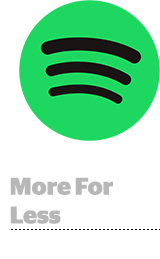 Here’s today’s AdExchanger.com news round-up… Want it by email? Sign up here.
Here’s today’s AdExchanger.com news round-up… Want it by email? Sign up here.
Free Ride
Spotify updated its free, ad-supported app on Tuesday with personalized playlists and other features. The changes elevate the user experience to within spitting distance of its paid tier. So why would anyone buy a subscription? “The better our free experience is, the more likely our free users will become Spotify premium users,” said Gustaf Söderström, chief research and development officer, at an event in New York City. There are no changes for brands, but a better user experience is good for advertisers, Brian Benedik, Spotify’s global head of sales, told AdExchanger. “If we see the engagement rates of these users start to accelerate, that’s what brands are looking for,” he said. Scale is important, “but engagement, I’d argue, is more important.” TechCrunch has more.
#GDPRprep
Twitter is getting its ducks in a row before GDPR hits Europe in one month. The company outlined changes to its privacy policy to give users more information on data it collects, how data is used and the controls users have over their data. Starting this month, Twitter is also trying to make personal data management easier, such as with a privacy policy not written in legalese. “We think it’s absolutely essential that you know exactly what we mean when we refer to location data or data from advertising partners,” writes Twitter data chief Damien Kieran in a blog post. Twitter may not have the vast quantities of data available to Google or Facebook, but it’s got its fair share of demographic data, behavioral data and social buttons across the web that allow it to gather data, even if users aren’t logged in.
Sell-Side Consent
In related GDPR news, AppNexus publisher clients Axel Springer and Schibsted Media are among the first to adopt the regulation’s consent framework developed by IAB Europe and The IAB Tech Lab. “We believe a standardized industry framework is necessary to not only meet transparency and user choice requirements, but also to maintain a high-quality user experience for our audiences,” says Moritz Holzgraefe, Axel Springer COO for corporate development platforms, in the blog post. The IAB GDPR consent framework was published last month [AdExchanger coverage], and it faces barriers to adoption as media companies sort out whether they will permit first-party consent to be transmitted to programmatic vendors – and the potential revenue impacts if major buy-side platforms aren’t able to place data-driven bids on inventory.
The Nielsen Index
In advance of the upfronts, Nielsen is pitching advertisers and publishers on a new TV forecasting tool and audience API. The tool will help networks evaluate which programs and day parts in their portfolios (or their competitors’) index are highest for any given audience, Kelly Abcarian, SVP of product leadership for Nielsen, said at the measurement firm’s annual upfronts press event. Advertisers can use it to improve audience discovery across networks and reduce waste. Nielsen’s new forecasting comes baked with 80-plus so-called advanced audience segments, with Nielsen Catalina purchase segments to come soon.
Google’s Podcast Dreams
Google is launching a podcast product and plans to double its listener base, writes Steve Pratt, co-founder of the podcast production company Pacific Content, in a Medium post. The product will link to podcasts from Google searches and provide a “home base” where users can access and subscribe to content. The ingredients are there for a dedicated Android podcast app – with an assist from Google’s search engine. “Since our first launch, we’ve seen a surprising number of people return through search day in and day out,” says Zack Reneau-Wedeen, Google podcasts product manager. Read the post. The news comes on the heels of Apple acquiring Texture, a subscription media bundling service. AdExchanger has more on that.
But Wait, There’s More!
You’re Hired!
This post was syndicated from Ad Exchanger.

More Stories
How A Digital Media Agency Built Its Own AI-Powered Contextual Targeting Tool
Rockit Global: The NZ Marketing Awards allows us to share our story
David Yurman Names PHD Global Media Agency of Record